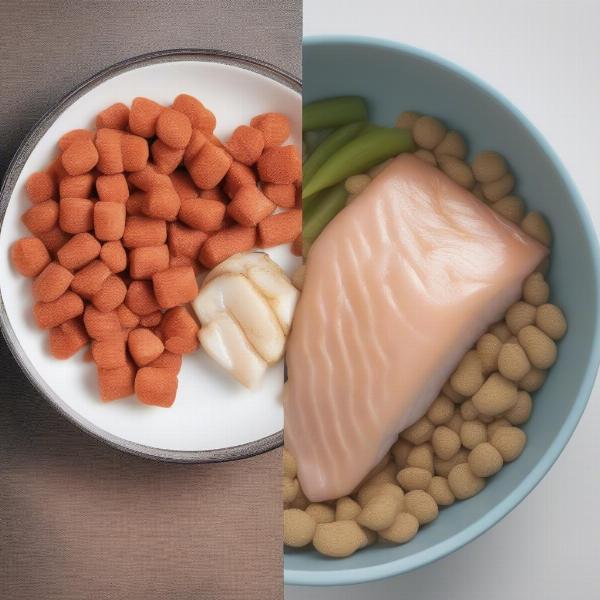Cod dog food has become increasingly popular among pet owners seeking alternative protein sources for their furry friends. But is it the right choice for your dog? This article explores the benefits, potential drawbacks, and things to consider when choosing cod-based dog food. We’ll delve into the nutritional profile of cod, discuss its suitability for dogs with allergies, and provide practical tips for integrating cod into your dog’s diet.
The Nutritional Benefits of Cod for Dogs
Cod is a white fish packed with essential nutrients that contribute to a dog’s overall health and well-being. It’s a lean protein source, rich in omega-3 fatty acids, which are known for their anti-inflammatory properties and support for skin and coat health. Omega-3s can also benefit dogs with joint issues, allergies, and cognitive function.
Cod is also a good source of vitamins and minerals, including vitamin B12, vitamin D, and selenium. Vitamin B12 is crucial for nerve function and red blood cell production, while vitamin D contributes to strong bones and a healthy immune system. Selenium is an antioxidant that helps protect cells from damage.
Is Cod Dog Food Suitable for Dogs with Allergies?
Many dogs suffer from food allergies, commonly triggered by proteins like beef, chicken, and lamb. Cod, being a novel protein, can be a suitable alternative for dogs with these sensitivities. However, it’s essential to remember that any protein can potentially cause an allergic reaction. If you suspect your dog has a food allergy, it’s crucial to consult with a veterinarian for proper diagnosis and guidance. They can perform tests to identify the specific allergen and recommend an appropriate diet.
Choosing the Right Cod Dog Food
Not all cod dog foods are created equal. When selecting a cod-based diet for your dog, look for high-quality ingredients and a balanced nutritional profile. Avoid foods with fillers, artificial colors, flavors, and preservatives. Check the ingredient list to ensure that cod is the primary protein source.
Incorporating Cod into Your Dog’s Diet
Introducing a new food should always be done gradually to avoid digestive upset. Start by mixing a small amount of cod dog food with your dog’s current food, gradually increasing the proportion of cod food over several days. Monitor your dog for any signs of digestive issues, such as vomiting or diarrhea.
“Introducing new foods slowly is key to a smooth transition,” says Dr. Emily Carter, DVM, a veterinary nutritionist. “This allows the dog’s digestive system to adapt to the new protein source and minimizes the risk of stomach upset.”
Fresh Cod vs. Cod Dog Food
While fresh cod can be a healthy treat, it shouldn’t replace a complete and balanced dog food. Commercially prepared cod dog food is formulated to meet a dog’s specific nutritional needs, whereas fresh cod alone may lack essential vitamins and minerals.
 Comparing fresh cod and commercial cod dog food
Comparing fresh cod and commercial cod dog food
Conclusion
Cod dog food can be a nutritious and palatable option for dogs, especially those with allergies. Its rich omega-3 fatty acid content, along with essential vitamins and minerals, contributes to a dog’s overall well-being. However, careful selection and gradual introduction are crucial for a successful transition to a cod-based diet. Remember to consult with your veterinarian for personalized advice.
FAQ
- Is cod dog food good for puppies? While cod can be a healthy protein source for puppies, choose a puppy-specific formula to ensure they receive all the necessary nutrients for growth.
- Can I feed my dog cod every day? Yes, as long as it’s part of a complete and balanced diet formulated for dogs.
- How much cod dog food should I feed my dog? Follow the feeding guidelines on the product packaging, adjusting the amount based on your dog’s weight, age, and activity level.
- What are the signs of a cod allergy in dogs? Common signs include skin rashes, itching, ear infections, vomiting, and diarrhea.
- Can I mix cod dog food with other types of dog food? While it’s generally safe, gradual introduction and monitoring are essential to avoid digestive problems.
- Where can I buy high-quality cod dog food? Look for reputable pet food stores or online retailers specializing in premium dog food.
- Is cooked cod better than raw cod for dogs? Cooked cod is generally safer as it eliminates the risk of parasites and bacteria.
ILM Dog is a leading international online resource for dog owners, providing expert advice on all aspects of dog care, including breed selection, health, training, nutrition, grooming, and more. We are committed to providing reliable, practical information to help you make informed decisions about your dog’s well-being. For expert advice tailored to your dog’s specific needs, contact us at [email protected] or +44 20-3965-8624. Visit ILM Dog for more information and resources on dog care.